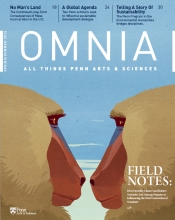This past December the U.S. Supreme Court began debating Fisher v. University of Texas, in which a white college applicant who was denied admission sued, accusing the university of having an affirmative action policy that gives preference to racial minorities. It’s considered a hallmark case of 2016 that could potentially impact affirmative action policies on a national level—and that’s the problem, A. Rahman Ford would tell you. Ford, a political science Ph.D. who recently successfully defended his dissertation, Affirmative Action Reconceived: A Comparative Study of Constitutional Precommitments to Group Preferences for Racial Minorities and Women, says narrow approaches to policy debate are only cementing misunderstanding.
Ford has dedicated his research to answering, simply, “What is affirmative action?” It’s a question that eludes the vast majority of people, and is under-researched, he says, because most debates surrounding the topic are too limited. “Some definitions focus on the beneficiary groups, while others are concerned with program implementation systems, like quotas. Still others focus on policy domains, such as employment or education.”
Ford, who has a law degree from Howard, decided that a comprehensive definition of affirmative action required a robust sample size that could only be achieved through the analysis of constitutional provisions for disadvantaged groups on an international level. To that end he opened his investigation to 30 countries.
“Some conservatives crystallize affirmative action as something that focuses on ‘brown people,’ and once they do that, then it becomes easy to vilify,” says Ford. “If we look across the globe, we see that various group preferences are very, very prevalent, almost to the point where they’re ubiquitous.” Another line of argument that Ford wanted to challenge is that affirmative action is inherently anti-democratic because it prefers one group over another. “My research shows that affirmative action often coincides with democratization,” says Ford, “particularly in societies that have heterogeneous populations that have a large degree of ethnic and racial diversity.”
Ethiopia, for example, contains a provision in its constitution that permits the state implementation of and provision of special attention to remedy the “[h]istorical legacy of inequality and discrimination suffered by women,” while policies in India help to address social and financial disparities created by the caste system. And while controversy does exist in other countries, like Brazil, for instance, which employs social precommitments in the form of economic redistribution, it does not lead to the name-calling and racial tunnel vision Ford cites in America.
America’s obsession with the racial component of affirmative action works against the average citizen’s comprehension of other provisions, Ford says, often because the media does not cover them. “Most people don’t realize that Barack Obama, in his first term, issued an executive order expanding affirmative action for people with disabilities,” Ford says. “But if the President issued an executive order expanding affirmative action for blacks, certain segments would have crucified him. So we have the nuance in the U.S., strictly speaking, but in the popular and even academic discussion, it’s absent.”
Ford’s journey to the defense of his dissertation took an unexpected turn when a struggle with his health sidelined his research. When Ford, who has a degenerative muscular disease, arrived at Penn in 2004, he was mobile and relatively healthy. But by 2008, he had lost his ability to eat, and soon after, his mobility. He developed chronic fatigue and required 14 hours of sleep a day.
“It got very difficult, but it sent me on a parallel journey,” Ford says. “The formal dissertation was the reason why I was at Penn, but after 2010, I realized that I had a second dissertation, and that was to discover what was wrong with me. That culminated in 2015, when I began treatments and my chronic fatigue broke and I had the energy to finally do the work I needed to do on my dissertation.”
It was a journey that Rogers Smith, Christopher H. Browne Distinguished Professor of Political Science, who oversaw Ford’s dissertation, says took extreme dedication and fortitude. “Rahman's dissertation is an impressive, well-researched, well-written study of comparative constitutional provisions for different types of affirmative action policies,” Smith says. “He shows emphatically that a wide range of group preferences, for linguistic, ethnic, racial and national minorities and women, are the overwhelming norm, not the exception. His evidence and arguments correct many prevailing conceptions of what constitutionalism means globally today. It would be a substantial achievement by any scholar. To have completed it in the face of such daunting medical challenges is a truly inspiring achievement.”
“All I can say is I’m just hard-headed,” laughs Ford, who plans to turn his research into a book. “I didn’t want to give up. And even though it took twice as long as I thought it would, I realize now in hindsight everything proceeded in the way it had to.”




